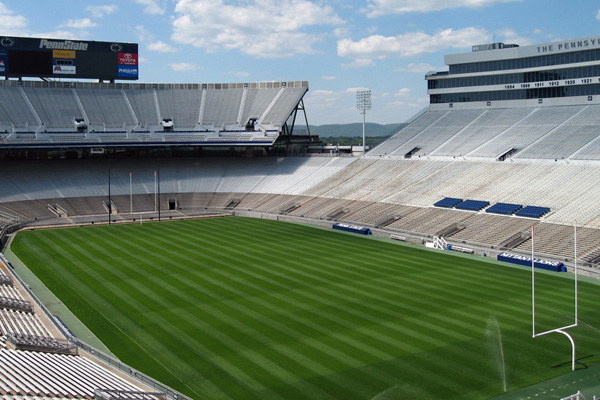3Qs: Does the punisment fit the crime at Penn State?

[media-credit id=20 align=”alignright” width=”150″] [/media-credit]The NCAA levied a series of severe penalties against Penn State University’s football program on Monday in the wake of a child sex-abuse scandal involving former assistant coach Jerry Sandusky. We asked Roger Abrams, the Richardson Professor of Law in Northeastern’s School of Law and an authority on sports law, to explain whether the punishment fit the crime.
[/media-credit]The NCAA levied a series of severe penalties against Penn State University’s football program on Monday in the wake of a child sex-abuse scandal involving former assistant coach Jerry Sandusky. We asked Roger Abrams, the Richardson Professor of Law in Northeastern’s School of Law and an authority on sports law, to explain whether the punishment fit the crime.
NCAA President Mark Emmert argued that the punishment brought down against Penn State could be viewed as “greater than any other seen in NCAA history.” In your opinion, does the punishment fit the crime, or should the college sports’ governing body have shut down the university’s football program?
The NCAA punishment of Penn State was swift, sure and severe. The $60 million fine, combined with the reduction in scholarships and the multiyear banning from postseason play, is fitting and proper. Vacating Penn State’s victories from 1998-2011 is the only penalty that could be imposed on the late head coach Joe Paterno. He will no longer be recognized in the record books as the college football coach with the most lifetime victories.
Suspending football for a few years, the so-called “death penalty” most recently imposed on Southern Methodist University in 1987, would have injured not only Penn State, but also all of its scheduled opponents who would have an open date that could not have been filled. By comparison, the array of NCAA penalties will drive Penn State toward rehabilitating not only its image, but also the reality of the role football plays on its campus.
What kind of effect will this ruling have on future policy regarding high-profile cases of rules violations in college athletics?
Every NCAA sanction is imposed not only to punish a college or university, but also to deter similar violations by member schools. While college sports programs attempt to improve their lot within the boundaries set by the NCAA, the prospect of such immense penalties is bound to make the members more vigilant when it comes to reporting criminal violations to the public authorities. The Penn State case involves a failure of institutional control over the athletic department. As such, it should give university administrations more power in dealing with their own football and basketball coaches, who in many instances are the most powerful men on campus.
How would the penalties levied against Penn State’s football program have been different had it been a professional sports organization?
Some have suggested — only half in jest — that major college football and basketball are professional sports organizations, except for the minor fact that the players don’t get paid. If an NFL team had countenanced child abuse in its locker room, the commissioner would have likely forced the owners to sell the franchise. All pro sport commissioners have the power to act “in the best interest” of their sports, and perpetrating or allowing crimes of this magnitude to occur in the workplace would warrant a lifetime ban from the game.





